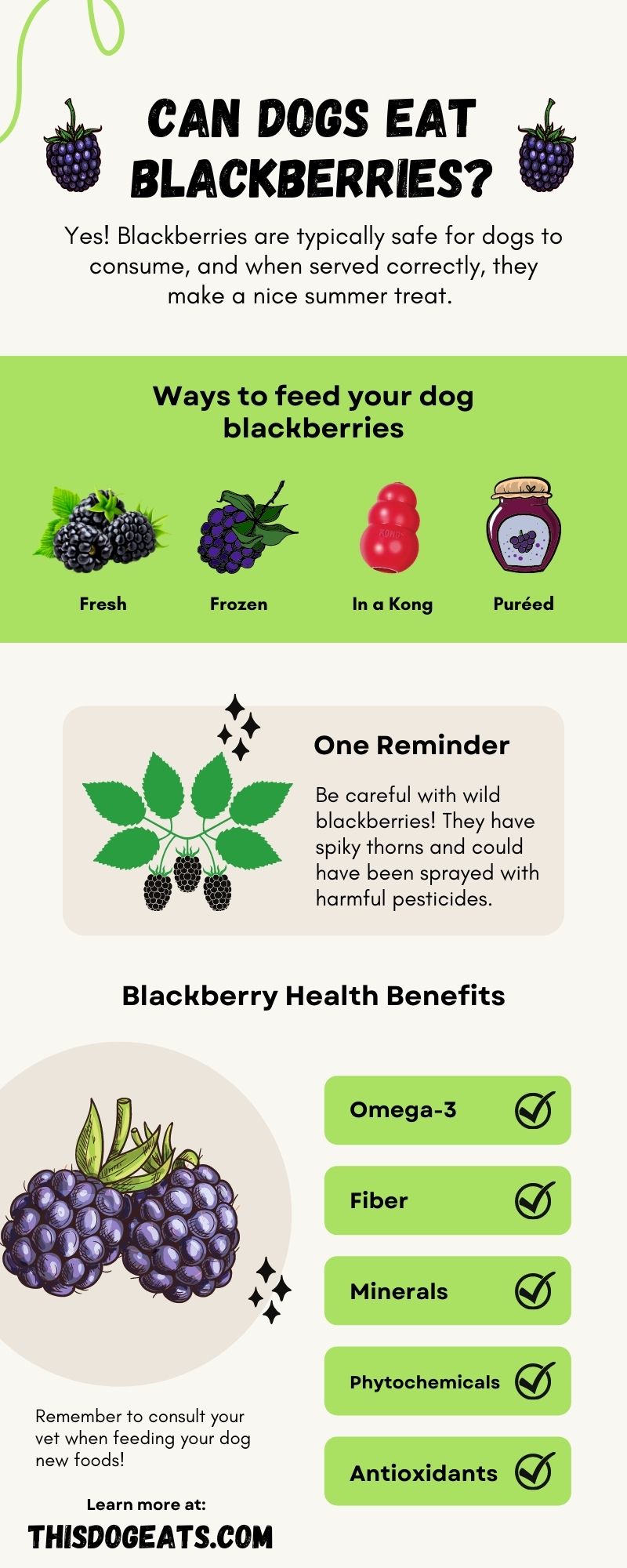Can dogs eat blackberries?
Come summer, blackberries – also known as brambles – start popping up all over the place. You may spot these dark, juicy little berries at your local farmers market, in a supermarket, or growing in blackberry bushes. While it’s perfectly fine for you to pop a few in your mouth, what about your dog?
Luckily, blackberries are typically safe for dogs to consume, and when served correctly, they make a nice summer treat. Here’s what you need to know about feeding your dog blackberries.
Fun fact: The blackberry is in fact not a berry! Botanically, it’s an aggregate fruit, composed of small drupelets.
Can dogs eat blackberries?
Yes, dogs can eat blackberries! This bite-sized superfood packs a powerful punch of nutritional benefits, making them a great snack to add to your dog’s menu.
Just be sure to feed your dog blackberries in limited quantities – moderation is key! Don’t let them gorge on the berries, no matter how juicy, sweet and delicious they may be.
And, as always, consult your veterinarian before offering your dog any new foods.
Tip: Hybrid versions of the blackberry, like the loganberry, are also safe for your dog to eat.
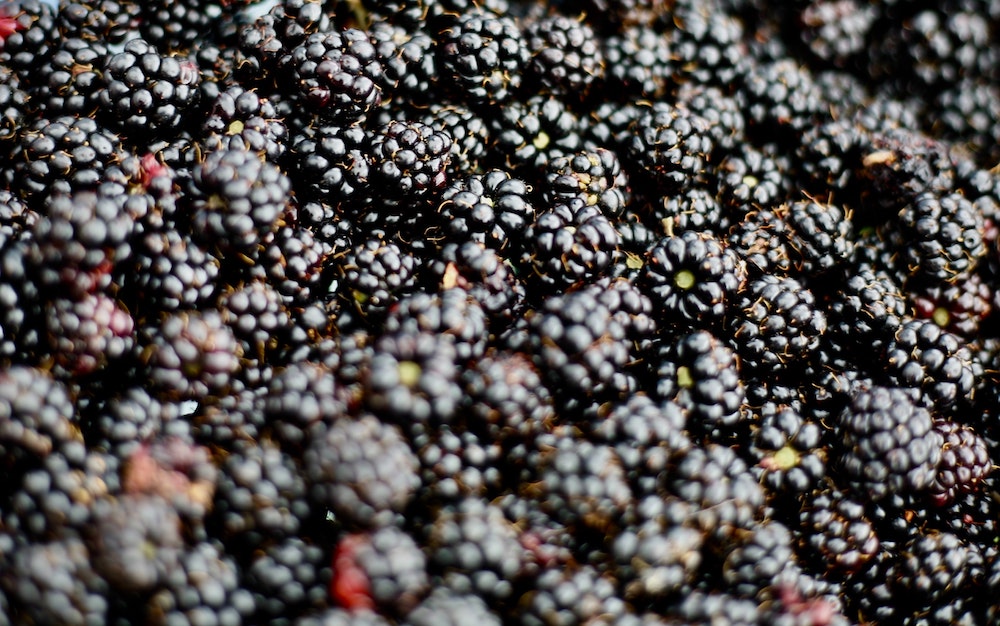
Health benefits of blackberries
Dark, juicy blackberries are packed with loads of nutritional benefits, so much so that they’re often referred to as a superfood. Plus, they’re low in calories!
Blackberries are a nutrient rich treat and an excellent source of the following:
Vitamins: Blackberries contain Vitamin A, Vitamin B, Vitamin C, Vitamin E and Vitamin K. Vitamins boost your dog’s immune system, reduce inflammation, and support proper function and quality of skin, coat, muscles, and nerves. They also increase bone density.
Omega-3 Fatty Acids: Fatty acids keep your dog’s skin and coat healthy and shiny. They also improve their heart health and cognitive function.
Minerals: Blackberries have trace amounts of certain minerals, like potassium, calcium, zinc, copper, and manganese. These minerals support bone and muscle growth, among other things, and aid in your dog’s body’s ability to use vitamins and vital nutrients more efficiently.
Fiber: Fiber promotes healthy bowel movements, colon health, and relieves your dog of constipation. It also aids in weight management.
Phytochemicals: Phytochemicals are naturally occurring chemical compounds found in plants. They’re linked to loads of health benefits, which include fighting cancer and reducing inflammation in certain chronic diseases.
Antioxidants: Antioxidants help fight free radicals, which are responsible for cellular and molecular damage. Blackberries contain antioxidants like anthocyanins.
Blackberries are also low in calories – one cup of blackberries contains only 62 calories – making them a great option if your pup is on a diet.
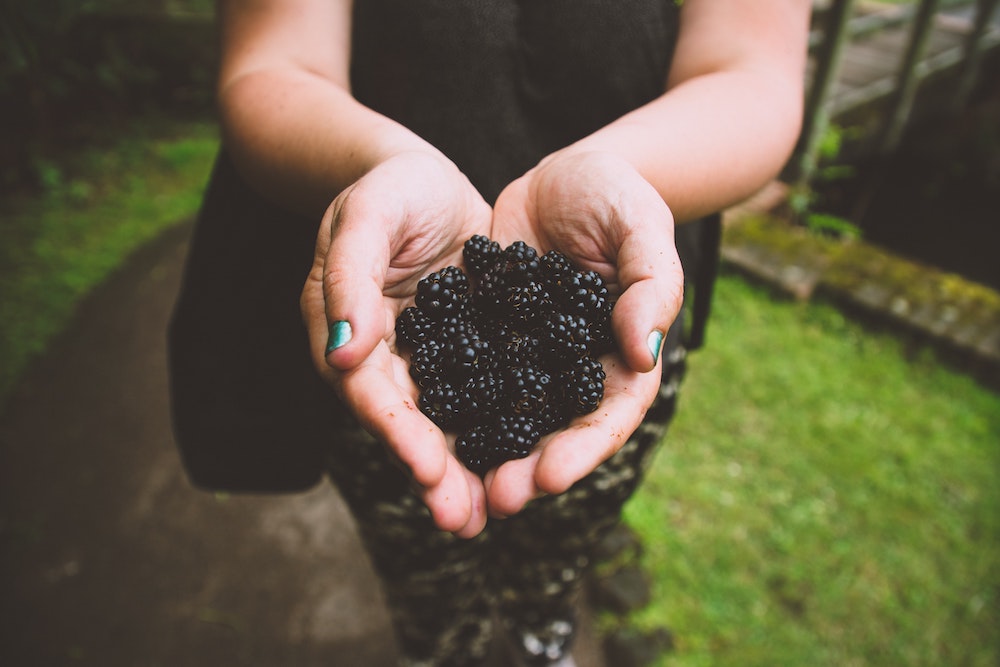
Are there dangers associated with blackberries and dogs?
Blackberries are both healthy and safe for dogs. After getting the green light from your vet, introduce blackberries to your dog gradually.
Monitor their reaction to ensure everything is ok. This is especially important if your dog has a sensitive stomach. And remember, always feed them blackberries in moderation!
Here are potential risks you should be aware of:
Sugar Content
Blackberries contain a lot of sugar! Too much sugar is bad for your dog, and consuming too many blackberries can lead to adverse effects, like diarrhea or vomiting. An excess amount of sugar can lead to weight gain and other issues.
Xylitol
Xylitol is a common sweetener used in sugar-free foods, like gum and peanut butter. It’s toxic to dogs.
Blackberries contain a very small amount of natural xylitol, but don’t freak out! Xylitol is found naturally in many fruits and vegetables. It’s only life-threatening if fed in high doses, so don’t let your dog go nuts and eat as many blackberries as their heart desires.
Fiber
Blackberries are high in fiber, which means they’re great at regulating your dog’s digestive system. But too much fiber can lead to an upset stomach, indigestion, gas, vomiting, or diarrhea.
Size
Blackberries are perfectly bite sized for medium and large dogs, but they might pose a choking hazard for dogs on the smaller side. Help those little pups out and cut the berries in half.
Allergies
Although it’s rare for a dog to be allergic to blackberries, it could happen. Start by feeding them a very small amount, and check for signs of an allergic reaction.
Symptoms include swelling, itchiness, and breathing difficulties. Contact your vet immediately if you notice anything concerning.
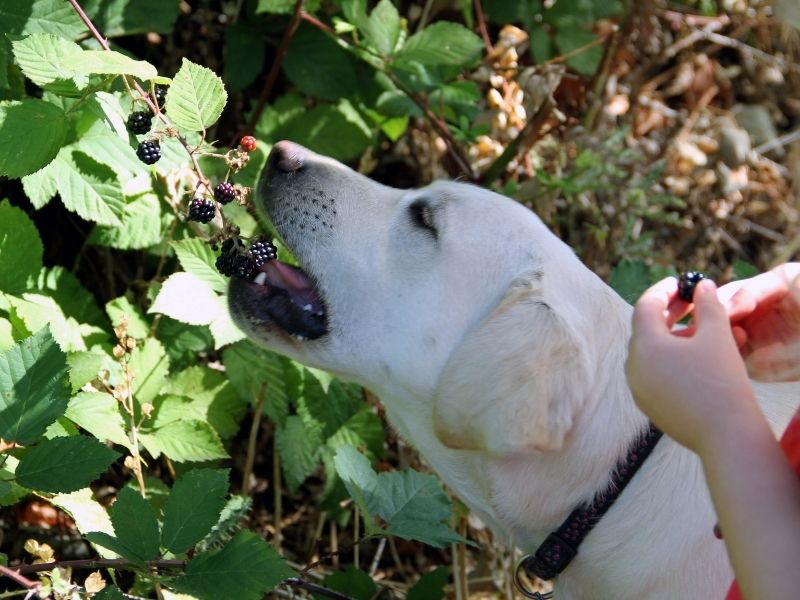
How to add blackberries to a dog’s diet
So, you’ve got a pint of blackberries and you want to give some to your dog. Lucky dog!
As always, ask your veterinarian before adding something new to your dog’s diet. Most dogs won’t react negatively to blackberries, but it’s always better to be safe than sorry.
Preparing the blackberries is easy! Wash and rinse them thoroughly to remove any dirt, herbicides, or pesticides. This is especially important if your blackberries aren’t organic.
If your dog is medium-sized or larger, then blackberries already come in perfect bite-sized pieces. If your dog is on the smaller side, you may want to cut the blackberries in half, to avoid them becoming a choking hazard.
That’s it! Now you can serve them up to your dog and watch them enjoy. Don’t forget to keep an eye on them and monitor for any sort of adverse reaction.
Here are a few safe ways to feed your dog blackberries:
- Fresh: Toss a few blackberries to your dog, or add a couple as a food topper.
- Frozen: Freeze blackberries as a chilled treat. Perfect on a summer day! Freezing the berries also preserves them over time.
- In a Kong: Stuff a Kong with blackberries. You can freeze the toy overnight or give it to your dog at room temperature.
- Puréed: Purée the berries and serve as is, or mix with low-fat plain yogurt. This is great for senior dogs with few teeth.
- Food Topper: Throw some berries on top of your dogs meal as a tasty side dish.
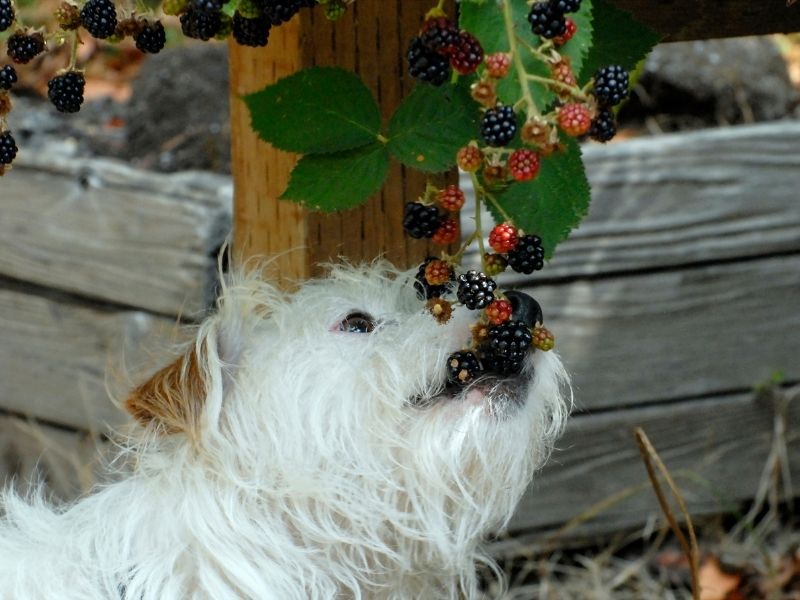
Can dogs eat wild blackberries?
Although blackberries are safe for dogs, you might want to skip the wild blackberries picked outside.
Depending on where you’re located, your dog may stumble upon a wild blackberry bush while on a walk or spending time outdoors.
There’s always a chance that blackberry shrubs, especially those located in gardens or parks, have been sprayed with pesticides or other chemicals. The chemicals are absorbed into the plant and can be harmful to your pet if consumed in large amounts.
It’s worth noting, however, that if these chemicals have been used in the correct concentrations, they’re unlikely to be harmful to your dog. That said, it’s probably best to avoid the risk altogether.
If your dog gets into a blackberry shrub, the good news is that blackberry leaves are not toxic for dogs, so if they gobble a few while foraging, don’t panic. However, a dog’s digestive system isn’t designed to handle a lot of plants, so there’s a chance your dog will get diarrhea, an upset stomach, or other gastrointestinal issues.
Your dog should also watch out for pricks, since blackberry plants are covered in spiky thorns, and sometimes inhabited by mosquitoes or wasps. They’re not exactly tongue-friendly.
For these reasons, it’s best to keep your dog away from blackberry bushes. If they do get into one, monitor your dog for signs of poisoning or illness. If any problematic signs appear, like vomiting or lethargy, contact your veterinarian ASAP.
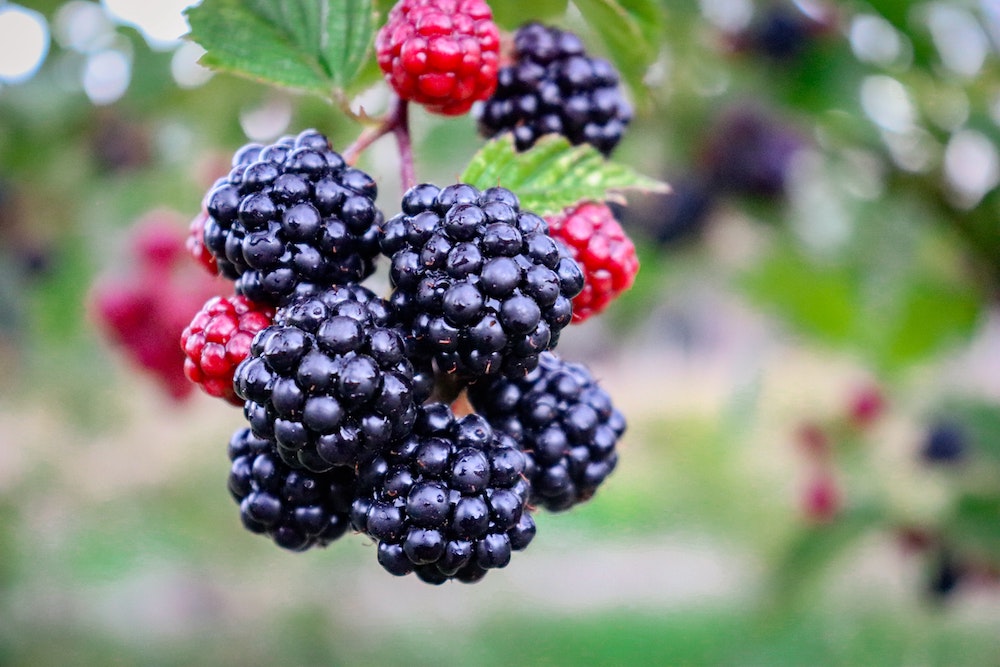
Can dogs eat blackberry jam?
Blackberry jam is commonly made using blackberries and a large amount of sugar. While the blackberries are ok for your dog to eat, the sugar is harmful – it can cause an upset stomach, diarrhea, or other gastrointestinal issues.
Additionally, blackberry jam sold in stores is often made with ingredients like xylitol, stevia, or other artificial sweeteners. There’s zero nutritional benefit to these additives, and they can be incredibly harmful to your dog.
It’s best to enjoy the jam on your own and feed your dog fresh blackberries instead.
Can dogs eat blackberry yogurt?
It depends! Dogs can safely eat plain yogurt that contains a few, fresh ingredients, like blackberries.
But many yogurts, particularly store bought versions, generally contain added sugars. They might even have artificial sweeteners like xylitol, which can be toxic for dogs. Those sugary, store-bought yogurts are a less healthy way of eating blackberries, and have poor nutritional value.
If you’ve made a healthier, unsweetened blackberry yogurt at home, feel free to feed it to your dog in moderation. You can use it as a food topper, put it in a Kong, or freeze it in ice cube trays to make ice cream. Just blackberries or blackberry purée mixed with plain yogurt is perfect!
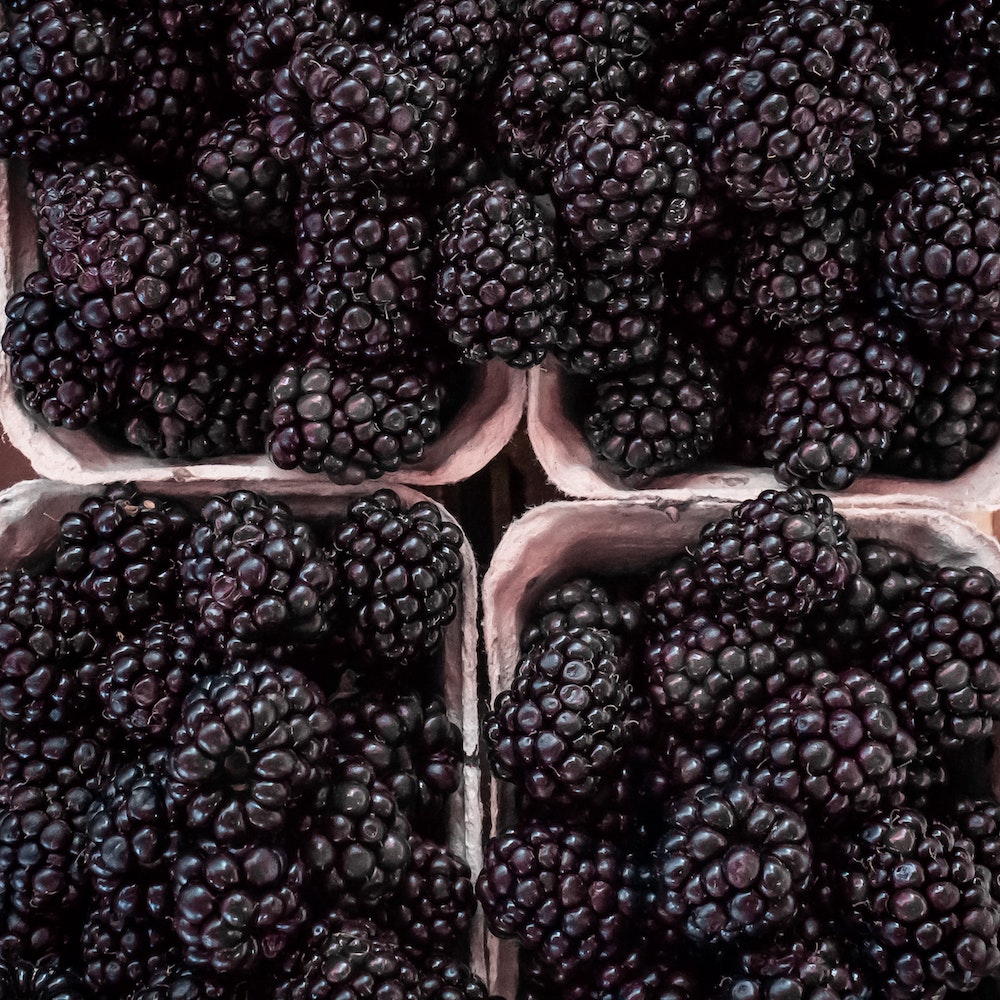
Can dogs eat blackberry pie?
Blackberry pie, albeit delicious, is full of ingredients that are best to avoid in your dog’s diet, like sugar, butter, and certain spices. They contain no nutritional value for your dog, and could cause an upset stomach or another host of issues.
When it comes to your dog’s diet, it’s best to skip the pie, and leave it for the humans.
Can dogs eat blackberry cobbler?
Cobblers are similar to pies; the difference being that pies always have a bottom crust, and cobblers don’t.
They’re made using pretty much the same ingredients, namely fruit, butter, flour, and typically lots of sugar, amongst other things.
Like blackberry pie, keep the cobbler for human consumption and don’t feed any to your dog.
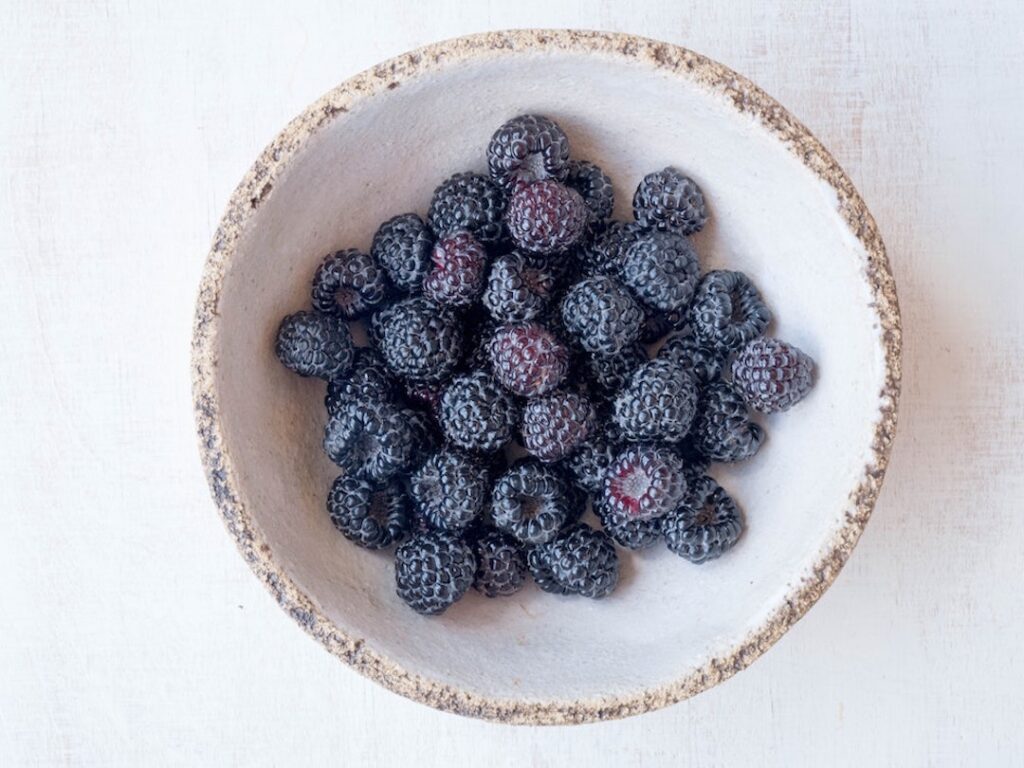
How many blackberries can I feed my dog?
This depends on your dog’s size – a large dog can eat more blackberries than a small one.
I like to follow the 90/10 rule: it states that 90% of your dog’s daily calories should come from their healthy, balanced dog food, and 10% should come from healthy treats and snacks.
In general, a small dog can have two blackberries a day, a medium dog can have four or five a day, and you can give six to eight to a large dog.
Keep in mind that every dog is different, and their reaction to blackberries will differ. And again, blackberries should always be given in moderation: less is more!
Speak to your vet if you have any questions or concerns.
Get the low down on your dog eating fruit! Click here for more information.
